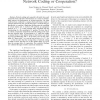Free Online Productivity Tools
i2Speak
i2Symbol
i2OCR
iTex2Img
iWeb2Print
iWeb2Shot
i2Type
iPdf2Split
iPdf2Merge
i2Bopomofo
i2Arabic
i2Style
i2Image
i2PDF
iLatex2Rtf
Sci2ools
109
click to vote
CISS
2007
IEEE
2007
IEEE
Data Dissemination in Wireless Broadcast Channels: Network Coding or Cooperation
—Network coding and cooperative diversity have each extensively been explored in the literature as a means to substantially improve the performance of wireless networks. Yet, little work has been conducted to compare their performance under a common framework. Our goal in this paper is to fill in this gap. Specifically, we consider a single-hop wireless network consisting of a base station and N receivers. We perform an asymptotic analysis, as N → ∞, of the expected delay associated with the broadcasting of a file consisting of K packets. We show that if K is fixed, cooperation outperforms network coding, in the sense that the expected delay is proportional to K (and thus within a constant factor of the optimal delay) in the former case while it grows logarithmically with N in the latter case. On the other hand, if K grows with N at a rate at least as fast as (log N)r , for r > 1, then we show that the average delay of network coding is within a factor less than two of the...
Related Content
| Added | 02 Jun 2010 |
| Updated | 02 Jun 2010 |
| Type | Conference |
| Year | 2007 |
| Where | CISS |
| Authors | Ivana Stojanovic, Masoud Sharif, David Starobinski |
Comments (0)

